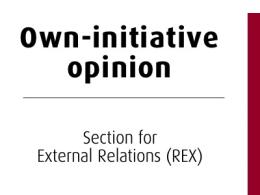European Economic
and Social Committee
AKP i Afryka
Od pierwszej konwencji z Lomé (1975 r.) do umowy z Kotonu (2020–2021) partnerstwa AKP–UE regulują relacje między UE a 79 członkami grupy państw Afryki, Karaibów i Pacyfiku (AKP), które od niedawna tworzą Organizację Państw Afryki, Karaibów i Pacyfiku.
Przez cały ten okres EKES, wspólnie ze społeczeństwem obywatelskim państw AKP, zabiegał o uznanie zasadniczej roli podmiotów niepaństwowych w procesie rozwoju, aż do osiągnięcia tego celu poprzez umowę z Kotonu, w której powierzono EKES-owi organizację spotkań i konsultacji z grupami interesów gospodarczych i społecznych z państw AKP i UE. Na tych posiedzeniach wysłuchuje się opinii zorganizowanego społeczeństwa obywatelskiego i umożliwia mu zabranie głosu. Celem jest krzewienie wymiany zdań i formułowanie zaleceń dotyczących spraw i polityki istotnych dla stosunków AKP–UE i przekazywanie ich następnie przywódcom UE i AKP.
Działania EKES-u związane ze stosunkami UE–Organizacja Państw Afryki, Karaibów i Pacyfiku są prowadzone głównie pod kierunkiem Komitetu Monitorującego AKP–UE, w skład którego wchodzą członkowie EKES-u i przedstawiciele grup interesów gospodarczych i społecznych z państw AKP.
Komitet Monitorujący AKP–UE utrzymuje regularne kontakty z przedstawicielami społeczeństwa obywatelskiego w państwach AKP na różnych szczeblach za pomocą następujących działań:
- regularnych posiedzeń Komitetu Monitorującego AKP–UE;
- regionalnych seminariów w państwach AKP, zapewniających forum dla debaty o sprawach będących przedmiotem wspólnego zainteresowania, z udziałem przedstawicieli społeczeństwa obywatelskiego, za każdym razem w innym regionie;
- posiedzeń generalnych grup interesów gospodarczych i społecznych z państw AKP i UE, odbywających się co trzy lata w Brukseli.
EKES utrzymuje też regularne kontakty z przedstawicielami grup interesów gospodarczych i społecznych Unii Afrykańskiej w ramach wspólnej strategii Afryka–UE. EKES w szczególności odbywa doroczne posiedzenia z siecią podmiotów gospodarczych i społecznych UE–Afryka.
Od wielu lat EKES utrzymuje regularne kontakty ze Wspólnym Zgromadzeniem Parlamentarnym AKP–UE, przedstawiając sprawozdanie ze swojej działalności na sesjach Zgromadzenia Plenarnego.
EKES blisko współpracuje również z międzynarodowymi organizacjami pracodawców, pracowników, rolników, spółdzielni i konsumentów. Organizacje te mianują przedstawicieli AKP zapraszanych na posiedzenia odbywane przez EKES, w tym na posiedzenia Komitetu Monitorującego AKP–UE.
